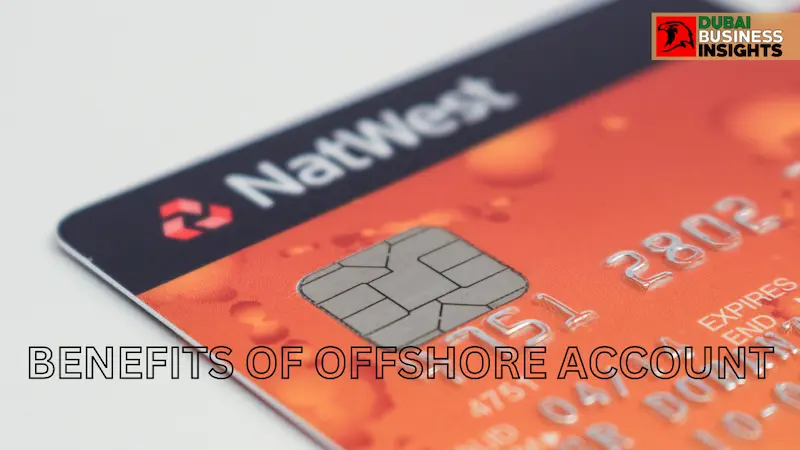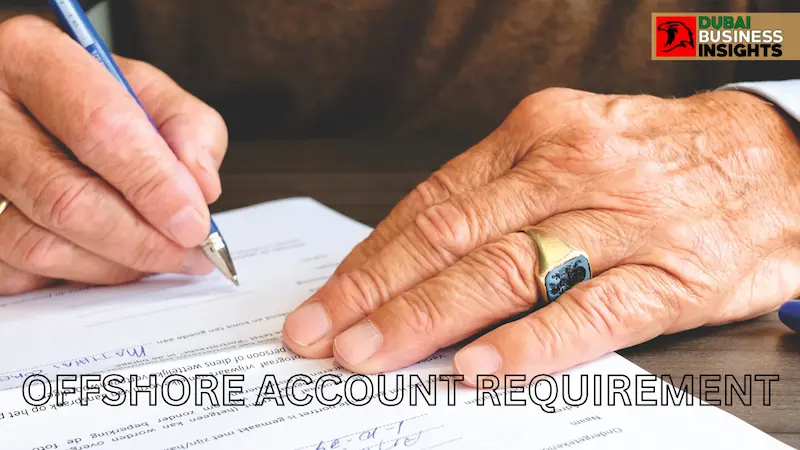Offshore Bank Account in UAE: In today’s globalized world, managing your finances efficiently is crucial. Offshore bank accounts have emerged as a powerful tool for individuals and businesses alike. They offer numerous benefits, including asset protection, tax advantages, and increased privacy. In this comprehensive guide, we will delve into the world of offshore bank accounts, exploring what they are, why they matter, and how to open one in the UAE. So, let’s embark on this financial journey and unlock the potential of offshore banking.
Understanding Offshore Bank Accounts
Offshore bank accounts are often misunderstood. In this section, we clarify what offshore accounts are, debunk common misconceptions, and highlight the incredible benefits they offer.
What Is an Offshore Bank Account?
An offshore bank account is a financial account held in a foreign country by an individual or entity. It’s a tool that offers unique financial advantages and flexibility. Essentially, it’s like having a bank account outside your home country. These accounts can be used for various purposes, including asset protection, financial privacy, and international transactions. They’re especially popular among expatriates, international business owners, and individuals seeking to diversify their assets.
Offshore accounts are attractive due to their potential tax benefits and confidentiality. They often offer tax advantages like reduced or zero taxes on earned interest, capital gains, or inheritance. Furthermore, these accounts provide financial privacy since they are held in foreign jurisdictions with robust banking secrecy laws.
While offshore bank accounts offer numerous benefits, they must be used in compliance with local and international tax laws and regulations. It’s crucial to declare any offshore assets to your home country’s tax authorities and remain transparent about your financial activities. This ensures that you can enjoy the advantages of offshore banking without falling afoul of the law.
Common Misconceptions Debunked
There is a misconception that offshore accounts are primarily for tax evasion. In reality, offshore accounts offer stability, tax advantages, and opportunities for diversifying assets.
- Tax Evasion: Offshore accounts are often associated with tax evasion, but in reality, they are not illegal. Using offshore accounts to evade taxes is against the law.
- Only for the Wealthy: Offshore accounts are not exclusive to the super-wealthy. They can be beneficial for a wide range of people, from expatriates to international business owners.
- Lack of Transparency: While offshore accounts offer privacy, this doesn’t mean they are entirely secret. Most countries require account holders to report offshore assets.
- High Risk: Offshore accounts can be just as safe as domestic ones when established with reputable banks. They may offer higher stability in some jurisdictions.
- Complexity: While there can be some paperwork involved, opening an offshore account is not necessarily more complex than a domestic one, especially with the help of professionals.
- Illegal Activities: Offshore accounts are not inherently tied to illegal activities. Many people use them for legitimate purposes such as international business transactions and asset protection.
Benefits of Offshore Bank Accounts

We explore the various advantages of offshore accounts, such as protection against political and currency risks, tax benefits, competitive exchange rates, and confidentiality.
- Tax Efficiency: Offshore bank accounts often come with favorable tax policies. Some countries offer reduced or zero tax on interest income, capital gains, or inheritance.
- Asset Protection: These accounts can safeguard assets from political instability, lawsuits, or economic crises in the account holder’s home country.
- Currency Diversification: Holding assets in different currencies can minimize the risks of currency devaluation in a single country.
- Privacy: Offshore accounts offer a level of privacy, ensuring that financial transactions remain confidential.
- Global Access: Access to international markets, investment opportunities, and a wide range of financial products can be easier with an offshore account.
- Ease of Management: Some offshore banks provide sophisticated online banking platforms, making it convenient to manage assets from anywhere.
- Estate Planning: Offshore accounts can simplify inheritance and estate planning, with provisions for smoother wealth transfer.
- Protection from Political Risks: Offshore accounts can protect assets from government interference, such as capital controls or sudden taxation changes in the home country.
- Investment Opportunities: In some offshore jurisdictions, unique investment opportunities and wealth management services are available.
- Global Mobility: Ideal for expatriates and international business professionals, offshore accounts offer the flexibility to move and manage funds across borders.
Navigating the UAE Offshore Banking Landscape
In the UAE, offshore banking is thriving. We explore why the UAE is an excellent choice for offshore banking and differentiate between personal and corporate accounts.
Why Choose the UAE for Offshore Banking?
The UAE’s political stability and tax flexibility make it a hub for offshore banking. Discover why so many individuals and businesses choose the UAE.
- Economic Stability: The UAE is known for its political stability and a robust, diversified economy. It offers a secure environment for offshore banking.
- Tax Benefits: With no personal income taxes, capital gains taxes, or inheritance taxes, the UAE provides attractive tax advantages for offshore account holders.
- Global Financial Hub: Dubai, one of the UAE’s emirates, is an international financial center, connecting investors and businesses globally.
- Business-Friendly: Offshore account holders can also benefit from UAE’s business-friendly policies, which encourage entrepreneurship and innovation.
- Currency Options: UAE offshore banks offer multi-currency accounts, allowing for diversified asset portfolios in various currencies.
- Strong Banking System: The UAE boasts a well-regulated banking sector with a reputation for security and adherence to international banking standards.
- Asset Protection: Offshore accounts in the UAE can provide asset protection from risks in the account holder’s home country, ensuring financial security.
- Financial Privacy: The UAE offers strict financial confidentiality, ensuring privacy and security for account holders.
- Innovative Banking Services: UAE offshore banks provide cutting-edge online banking services, making it convenient to manage assets globally.
- Strategic Location: Its strategic geographical location bridges international markets, making the UAE a prime choice for offshore banking.
Differentiating Between Personal and Corporate Accounts
Understanding the distinction between personal and corporate accounts in the UAE is crucial for your offshore banking journey.
- Ownership and Purpose: The fundamental difference between personal and corporate offshore accounts lies in their ownership and intended use. Personal offshore accounts are held by individuals for private wealth management, while corporate accounts are established by businesses for commercial purposes.
- Account Requirements: Personal offshore accounts typically require personal identification documents, while corporate accounts necessitate legal business documentation, such as the Articles of Association and Memorandum of Association.
- Taxation: Personal offshore accounts cater to an individual’s financial needs, offering tax efficiency for personal wealth. In contrast, corporate offshore accounts help businesses optimize their tax strategies, allowing them to reduce tax liabilities legally.
- Regulations: Personal and corporate offshore accounts are subject to different regulatory frameworks. Personal accounts may have simpler compliance requirements, while corporate accounts are subject to more complex regulations due to their business nature.
- Asset Protection: Personal offshore accounts primarily focus on safeguarding an individual’s assets, while corporate accounts aim to protect a business’s finances, assets, and liquidity.
- Banking Services: Personal accounts emphasize services tailored to individuals, such as savings and investment options. Corporate accounts provide specialized services like payroll management and international transactions to support business operations.
- Privacy: While both personal and corporate offshore accounts offer a degree of privacy, corporate accounts may have stricter reporting requirements due to anti-money laundering (AML) and know-your-customer (KYC) regulations.
- Liability: In the case of corporate accounts, the business itself is liable for debts and obligations, whereas personal offshore accounts offer protection from personal liabilities.
Understanding these distinctions is crucial for selecting the right offshore account type that aligns with your financial goals, whether on an individual or business level.
Preparing to Open an Offshore Account

To open an offshore account in the UAE, specific documentation is required. We provide a step-by-step guide on gathering the necessary paperwork for personal and corporate accounts.
Required Documentation for Personal Accounts
For personal accounts, you’ll need documents like your passport with a UAE entry stamp and proof of your residence, among others.
- Proof of Identity: When opening a personal offshore account, you’ll need to provide a valid passport or national identity card. This document serves as the primary proof of your identity and citizenship.
- Address Verification: To confirm your residential address, offshore banks often request utility bills, rental agreements, or bank statements. This step ensures compliance with anti-money laundering (AML) regulations.
- Bank Reference Letter: Some offshore banks may require a reference letter from your current bank. This letter attests to your financial history and your ability to manage banking relationships responsibly.
- Source of Funds: You’ll need to clarify the source of the funds you plan to deposit into your offshore account. Transparency about the origin of your wealth is essential for legal compliance.
- Proof of Income: Many offshore banks ask for evidence of your income, which can include payslips, tax returns, or employment contracts. This information helps assess your financial stability.
- Personal Profile: Creating a personal profile or resume, summarizing your background and financial goals, can be beneficial when establishing a relationship with the offshore bank.
- Bank Application Forms: Filling out the bank’s application forms accurately and completely is a standard requirement. These forms collect essential information about your financial preferences and objectives.
- Notarization and Apostille: Depending on the offshore jurisdiction, certain documents, like your passport or bank reference letter, may need notarization or an apostille to confirm their authenticity.
Providing the necessary documentation for your personal offshore account is essential for a smooth account opening process. Compliance with these requirements ensures transparency and adherence to international banking standards.
The Process for Corporate Accounts
The procedure for corporate accounts includes documentation like Memorandum & Articles of Association, certification by the Ministry of Foreign Affairs, and client profiles.
Required Documentation for Corporate Offshore Accounts:
- Incorporation Documents: To open a corporate offshore account, you need the legal paperwork for your business, including articles of incorporation or registration certificates. This proves the legitimacy of your company.
- Board Resolution: A board resolution is a formal document that authorizes specific individuals within your organization to open and operate the corporate account. It typically needs to be signed by your company’s directors.
- Memorandum and Articles of Association: These documents outline the company’s purpose and internal rules. They’re often required to verify the company’s structure and activities.
- Proof of Business Activities: You may need to provide evidence of your business activities, such as contracts, invoices, or other documents that showcase the nature of your operations.
- Financial Statements: Offshore banks often request your company’s financial statements, including balance sheets and income statements. These help assess your financial stability.
- Business Plan: A business plan outlining your company’s objectives, anticipated transactions, and financial projections may be needed.
- Passport and Proof of Identity: The bank will need identification documents, such as passports, for authorized signatories on the account.
The Process for Corporate Offshore Accounts:
- Select an Offshore Jurisdiction: Choose a jurisdiction that aligns with your business needs and offers a favorable regulatory environment.
- Choose the Right Bank: Research and select an offshore bank that suits your business requirements.
- Contact the Bank: Initiate contact with your chosen bank and express your interest in opening a corporate offshore account.
- Submit Documentation: Gather and submit all the necessary documentation to the bank, including incorporation papers, board resolutions, and proof of business activities.
- Due Diligence: The bank will conduct due diligence, which includes background checks on the company and its directors.
- Account Approval: Once due diligence is complete, the bank will review your application and documentation. If approved, they’ll provide you with the account details.
- Initial Deposit: Make the initial deposit, as required by the bank, to activate the account.
- Accessing the Account: You can now access and manage your corporate offshore account for international transactions, investments, and other financial activities.
Opening a corporate offshore account involves a series of steps, with thorough documentation and adherence to legal requirements being paramount. The process ensures transparency and compliance with international banking standards.
Potential Challenges and How to Overcome Them
We address potential challenges in offshore banking, such as regulatory changes and transparency concerns. Discover how to overcome these obstacles and maintain a successful offshore account.
Addressing Regulatory Changes
Regulations can evolve. Learn how to stay compliant and adapt to any changes in offshore banking regulations.
- Stay Informed: The regulatory landscape for offshore accounts is constantly evolving. It’s crucial to stay updated with changes in international tax laws and regulations.
- Seek Professional Guidance: Engaging a financial advisor or consultant with expertise in offshore accounts can help you navigate complex regulatory changes. They can provide guidance on compliance and the latest legal requirements.
- Review Your Account Regularly: Periodically review your offshore account to ensure it complies with current regulations. If necessary, make adjustments to maintain compliance.
- Transparent Reporting: Be transparent when reporting offshore assets to tax authorities in your home country. Failure to do so can result in penalties or legal consequences.
- Consider Tax Treaties: Understand tax treaties between your home country and the offshore jurisdiction where your account is held. These treaties can impact your tax obligations.
- Comply with Anti-Money Laundering (AML) Regulations: Many offshore jurisdictions have stringent AML regulations. Ensure your account complies with these standards to prevent legal issues.
- Asset Protection: While complying with regulations, consider asset protection strategies within the boundaries of the law. Some offshore jurisdictions offer legal ways to safeguard your wealth.
- Adapt to Changes: Regulatory changes may necessitate adjustments in your offshore account structure. Consult with experts to adapt your financial strategy accordingly.
Maintaining Transparency in Offshore Banking
Maintaining transparency is vital. We discuss how offshore banks have improved transparency to combat financial crime and terrorism financing.
- Accurate Reporting: Transparency begins with accurate reporting. Provide truthful and complete information about your offshore account to tax authorities in your home country. This builds trust and ensures compliance with tax laws.
- Disclosure of Income: Disclose all sources of income associated with your offshore account. This includes interest, dividends, capital gains, or any other financial gains that should be reported to tax authorities.
- Regular Auditing: Regularly audit your offshore account and financial activities to ensure compliance with both local and international regulations. This practice helps detect and rectify any discrepancies promptly.
- Compliance with FATCA and CRS: Be aware of international agreements like FATCA (Foreign Account Tax Compliance Act) and CRS (Common Reporting Standard). These initiatives promote the exchange of financial information among countries to prevent tax evasion.
- Work with Professionals: Collaborate with financial advisors and consultants who specialize in offshore accounts. They can offer expert guidance on maintaining transparency and complying with regulatory requirements.
- Anti-Money Laundering (AML) Measures: Implement AML measures as required by your offshore jurisdiction. These safeguards help prevent illegal financial activities within the account.
- Document Retention: Keep thorough records of all financial transactions related to your offshore account. Proper documentation is essential to prove compliance and transparency.
- Legal Structures: Use legal structures for asset protection and privacy within the bounds of the law. Consult with professionals to ensure your chosen structures adhere to transparency regulations.
Diversifying Your Wealth through Offshore Accounts

Offshore accounts can help you diversify your wealth. We explore strategies for maximizing investment opportunities and the role of offshore private banking.
Strategies for Maximizing Investment Opportunities
By moving assets offshore, you can protect them from legal procedures. We discuss how offshore accounts boost your investment options.
- Diversification: One of the key strategies for maximizing offshore investments is diversification. Spread your assets across various classes, such as stocks, bonds, real estate, and currencies. This reduces risk and enhances potential returns.
- Tax Efficiency: Research the tax laws and benefits of your offshore jurisdiction. Utilize legal avenues to minimize tax liabilities on your investments, including capital gains and income.
- Asset Protection: Many offshore accounts offer enhanced asset protection. Utilize this feature to safeguard your wealth from legal threats, creditors, or potential lawsuits.
- Professional Guidance: Collaborate with financial advisors who are well-versed in offshore investing. They can help you identify the best opportunities, understand market trends, and navigate complex international regulations.
- Stay Informed: Keep yourself informed about global financial markets and economic trends. Being aware of political and economic developments can help you make informed investment decisions.
- Customized Solutions: Tailor your offshore investment strategy to align with your financial goals and risk tolerance. Customized solutions can optimize returns while managing risk.
- Regular Monitoring: Consistently monitor your investment portfolio and adjust it as needed. Be proactive in rebalancing your assets to maintain alignment with your financial objectives.
- Leverage Offshore Services: Take advantage of specialized offshore services, such as offshore trusts, to facilitate wealth transfer and estate planning.
The Role of Offshore Private Banking
Offshore private banking offers a suite of investment products and wealth management services. Find out which option suits your needs.
- Tailored Solutions: Offshore private banking provides customized financial solutions to high-net-worth individuals. These services are tailored to meet the unique needs and objectives of each client.
- Wealth Preservation: Offshore banks specialize in helping clients preserve their wealth. They offer strategies and tools that protect assets from risks like legal disputes, currency devaluation, or political instability.
- International Diversification: Offshore private banking facilitates international diversification of assets. By holding investments in different countries and currencies, clients can reduce risk and capitalize on global opportunities.
- Tax Efficiency: Wealthy individuals often use offshore private banking to optimize their tax situations. Many offshore jurisdictions offer favorable tax treatments, and private banks help clients structure their finances to minimize tax liabilities legally.
- Confidentiality: Privacy is a cornerstone of offshore private banking. Clients value the discretion and confidentiality offered by offshore banks, as it shields their financial affairs from undue scrutiny.
- Estate Planning: Offshore private banks assist clients with estate planning and wealth transfer. Trusts and other mechanisms can be set up to ensure a smooth transfer of assets to heirs and beneficiaries.
- Investment Expertise: Private banks employ experienced investment professionals who provide expert advice on a range of investment opportunities, from traditional assets like stocks and bonds to alternative investments like real estate.
- Risk Management: Offshore private banks offer risk management services, helping clients assess and mitigate financial risks. This ensures the protection and growth of their wealth.
Making the Right Choice

Selecting the right offshore bank is essential. We provide key considerations when choosing your offshore bank and list some of the top offshore banks in the UAE.
Key Considerations When Selecting Your Offshore Bank
Consider factors like reputation, services, fees, and accessibility when choosing the ideal offshore bank.
- Reputation and Regulation: Research the offshore bank’s reputation and ensure it operates under a robust regulatory framework. Opt for institutions known for financial stability and compliance.
- Account Services: Evaluate the range of services the bank offers, from simple savings accounts to complex investment options. Choose a bank that aligns with your financial needs and goals.
- Jurisdiction: Select the jurisdiction that best suits your financial objectives. Different offshore locations provide varying tax benefits and legal protections, so choose one that aligns with your preferences.
- Currency Options: Ensure the bank offers a variety of currencies for your accounts, allowing you to manage your wealth conveniently, especially if you have international transactions.
- Privacy and Confidentiality: Offshore banks are valued for their discretion. Confirm that the bank has strict privacy policies in place to protect your financial information.
- Fees and Charges: Scrutinize the fee structure of the bank, including account maintenance, transaction fees, and any hidden costs. Ensure they are transparent about charges.
- Accessibility: Consider how easily you can access your accounts. Online banking and customer support availability are vital, especially if you don’t live in the offshore jurisdiction.
- Security Measures: Verify the security measures in place to protect your funds, such as encryption, multi-factor authentication, and insurance coverage.
- Customer Support: Assess the quality of customer support. Responsive and knowledgeable support can make a significant difference in managing your accounts effectively.
- Account Opening Requirements: Understand the documentation and requirements for opening an offshore account. Ensure you have all necessary paperwork to expedite the process.
- Referrals and Recommendations: Seek referrals and recommendations from financial professionals or peers who have experience with offshore banking to gain insights into your options.
Top Offshore Banks in the UAE
We present a list of top offshore banks in the UAE to help you make an informed decision.
- Emirates NBD: A prominent choice for offshore banking, Emirates NBD offers a wide range of financial services and access to international markets.
- Abu Dhabi Commercial Bank (ADCB): ADCB provides offshore banking solutions tailored to individual and corporate clients, ensuring financial diversification and asset protection.
- Mashreq Bank: Known for its global banking services, Mashreq Bank assists in setting up offshore accounts, providing clients with access to international investment opportunities.
- First Abu Dhabi Bank (FAB): FAB’s offshore banking services allow clients to manage their wealth efficiently and take advantage of diverse financial products.
- National Bank of Fujairah: NBF offers secure offshore accounts and a variety of currency options, facilitating international transactions and asset management.
- Habib Bank AG Zurich: With a strong presence in the UAE, Habib Bank AG Zurich is a reliable choice for offshore banking services and asset protection.
- Finance House: Finance House offers a comprehensive suite of offshore banking solutions, including personalized investment strategies and wealth management.
- Al Fardan Exchange: Al Fardan assists clients in establishing offshore accounts, facilitating global fund transfers and investment opportunities.
The Future of Offshore Banking
In this final chapter, we offer predictions and trends for the future of offshore banking, emphasizing the role of digitalization in reshaping the industry.
Predictions and Trends
Get a glimpse into the future of offshore banking and the trends that will shape the industry.
- Digital Transformation: Offshore banks are expected to further embrace digital technologies, offering clients user-friendly online platforms, mobile apps, and streamlined account management.
- Enhanced Security Measures: With an increasing focus on cybersecurity, offshore banks will invest in robust security systems to protect clients’ assets and information.
- Diverse Investment Products: Offshore banking will likely see an expansion in the range of investment products offered to cater to various risk appetites, including ESG (Environmental, Social, Governance) investments.
- Global Regulatory Changes: Banks will adapt to evolving international banking regulations, ensuring compliance with global standards such as CRS (Common Reporting Standard) and FATCA (Foreign Account Tax Compliance Act).
- Sustainable Finance: Offshore banks may incorporate sustainable and ethical financial services into their offerings, aligning with the global shift towards responsible banking.
- Geographical Expansion: Offshore banks might establish a broader international presence, allowing clients to access a more extensive network of correspondent banks and services.
- Tailored Financial Solutions: There will be a growing emphasis on personalized financial solutions, addressing the unique needs of high-net-worth individuals, businesses, and investors.
- Economic Uncertainty Mitigation: Offshore banking will continue to attract clients looking to safeguard their wealth against economic and political instability in their home countries.
- Increased Transparency: Stricter reporting and transparency requirements may be implemented, improving offshore banking’s reputation and client trust.
- Blockchain and Cryptocurrency Integration: As blockchain and cryptocurrencies gain prominence, offshore banks may incorporate these technologies to offer more diverse financial services.
The Role of Digitalization
Learn how digitalization is revolutionizing offshore banking and making it more accessible and secure.
- Streamlined Account Management: Digitalization has revolutionized offshore banking by offering clients user-friendly online platforms. They can conveniently manage their accounts, transfer funds, and access financial information from anywhere in the world.
- Enhanced Security: Advanced cybersecurity measures are integrated into digital offshore banking systems to ensure the safety of sensitive financial data and transactions. These measures provide peace of mind to clients.
- Global Access: Clients can connect with their offshore accounts at any time, transcending geographical boundaries. This accessibility is crucial for international investors and businesses who require instant access to their funds and assets.
- Reduced Costs: Digitalization often translates to lower operational costs for offshore banks. These cost savings can be passed on to clients in the form of reduced fees or enhanced interest rates on deposits.
- Efficient Transactions: Digital offshore banking allows for swift and secure transactions, supporting global trade and investment. Cross-border transactions can be executed seamlessly, reducing delays.
- Paperless Operations: With digitalization, the need for physical paperwork diminishes. Instead, clients can access electronic statements, e-receipts, and other digital documents, contributing to environmental sustainability.
- Personalized Services: Offshore banks can use digital tools to provide tailored financial solutions. They analyze clients’ data to offer investment opportunities and services aligned with their unique financial goals.
- Compliance with Regulations: Digital systems can help offshore banks comply with international banking regulations like CRS and FATCA. They ensure that clients’ financial activities remain above board.
Conclusion:
By the end of this comprehensive guide, you’ll be well-versed in the world of offshore banking. You’ll understand what offshore accounts are, how to open one, and how to maximize the benefits they offer. Whether you’re an expat seeking financial security or a business looking to expand globally, offshore banking in the UAE is a valuable tool at your disposal. Take the first step towards financial freedom and unlock the potential of offshore banking.
Offshore Bank Account in UAE
FAQ
Q1: What is an offshore bank account?
A1: An offshore bank account is an account held in a foreign country, typically in a jurisdiction with favorable financial regulations. It allows individuals and businesses to manage their finances, access international markets, and benefit from tax advantages.
Q2: What are the benefits of having an offshore bank account?
A2: Offshore bank accounts offer benefits such as tax advantages, asset protection, higher interest rates, 24/7 availability, privacy, security, and investment opportunities. They also allow you to maintain a single account across borders if you frequently move.
Q3: What documents are required to open an offshore bank account in the UAE?
A3: The documents required for opening an offshore bank account in the UAE vary but typically include a passport with a UAE entry stamp, a company business plan, CV with relevant experience, legal company documents, proof of the company’s existence in other countries, bank account statements, and more for corporate accounts.
Q4: Are offshore bank accounts legal, and why do people use them?
A4: Offshore bank accounts are legal, and people use them for various reasons, including international business transactions, asset protection, confidentiality, and access to favorable tax rates. They can be a strategic part of financial planning.
Q5: What are the potential downfalls of having an offshore bank account?
A5: While offshore accounts have advantages, there are potential downfalls. These may include the need to prove document authenticity, strengthening regulations against financial crime, and potential requirements to provide evidence for the authenticity of documentation due to global efforts against money laundering and terrorism financing.

